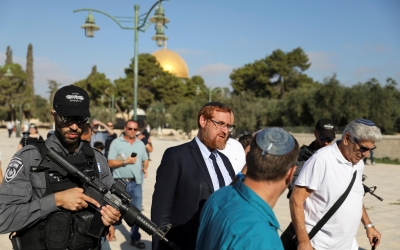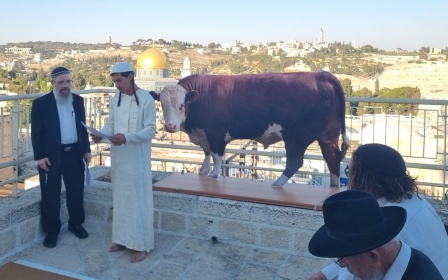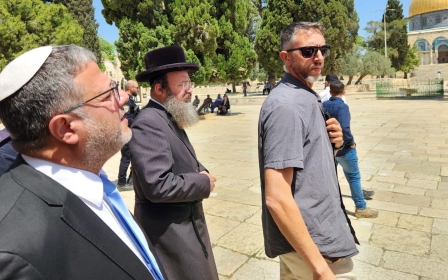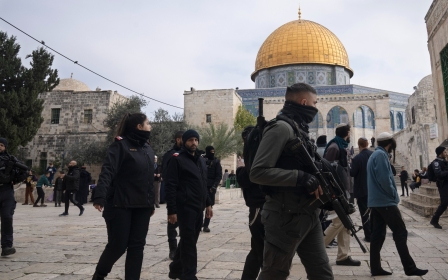Israel's Ben Gvir says Jewish prayer permitted at Al-Aqsa Mosque during large raid
Dozens of Israelis, led by ministers, prayed at Al-Aqsa Mosque during a large raid on Tuesday, violating decades-old arrangements that stipulate only Muslims can worship at the site in Jerusalem's Old City.
National Security Minister Itamar Ben Gvir, who was among the crowds, said: “Our policy is to allow Jewish prayer at the Temple Mount.”
Al-Aqsa Mosque is referred to as Temple Mount in Judaism and is considered holy to Jews.
For decades, a delicate status quo has governed worship and visits to the site, permitting only Muslims to pray in its courtyards and prayer halls.
Non-Muslims have been allowed to visit under the supervision of the Waqf, a joint Jordanian-Palestinian Islamic trust that manages the mosque's affairs.
New MEE newsletter: Jerusalem Dispatch
Sign up to get the latest insights and analysis on Israel-Palestine, alongside Turkey Unpacked and other MEE newsletters
However, Israeli authorities have long bypassed the Waqf, allowing Israeli settlers and ultra-nationalists to storm the site under the protection of heavily armed forces, often preceded by the forceful removal of Muslim worshippers.
Israeli police have also been accused in recent years of allowing Jewish prayer at the site.
The Israeli government has long insisted that it remains committed to maintaining the status quo.
However, Ben Gvir’s comments on Tuesday are likely to spark condemnation from Palestinians, who have long accused Israel of attempting to undermine the mosque’s Islamic identity.
Palestinians accuse government-backed right-wing groups of working to divide Al-Aqsa Mosque into two parts, one for Jews and the other for Muslims.
Israeli settlers wave the flag of Israel after breaking into Al Aqsa mosque under the protection of occupation forces. pic.twitter.com/fkEjVhy4zB
— Eye on Palestine (@EyeonPalestine) August 13, 2024
Israeli organisations known as "Temple Mount groups" have facilitated raids on Al-Aqsa Mosque, pushed for an increased Jewish presence there and advocated for the destruction of the mosque and the Dome of the Rock to make way for a Third Temple.
Dozens of Temple Mount activists organise and participate in daily raids of the mosque under the protection of Israeli police.
The raids often draw large crowds on Jewish holidays.
According to the Waqf, more than 2,250 people participated in Tuesday's raid, which coincided with Tisha B’Av, an annual fast day marking the destruction of the two ancient Jewish temples that once stood on the plateau where Al-Aqsa Mosque is located.
The Palestinian Authority and Jordan both issued statements condemning the raid, calling it a violation of international law.
Israel's control of East Jerusalem, including the Old City, violates several principles of international law, which stipulate that an occupying power has no sovereignty over the territory it occupies and cannot make any permanent changes there.
'Our policy is to enable prayer'
Dozens of people performed Jewish prayers, raised Israeli flags and sang the national anthem during Tuesday's raid, actions that are widely seen as violations of the long-standing status quo.
At least two government ministers and a lawmaker attended the raid, including Ben Gvir.
While touring the site, Ben Gvir said in a recorded message: “We are on Tisha B’Av, the Temple Mount, coming to mark the destruction of the temple."
“It needs to be said with sincerity: there is very significant progress here in governance and sovereignty. As I have said, our policy is to enable prayer.”
The office of Prime Minister Benjamin Netanyahu responded to Ben Gvir’s comments, saying ministers cannot set their own policies and that the incident was a “deviation from the status quo”.
“Israel’s policy at the Temple Mount hasn’t changed - this is how it has been and how it will continue to be,” his office said.
However, despite many people openly praying and violating the rules, Israeli police have not announced any arrests, according to the Times of Israel.
Ben Gvir hit back shortly after the prime minister's statement, saying that the "Temple Mount is a sovereign area in the state of Israel’s capital" and that there were no laws that permit "engaging in racist discrimination against Jews at the Temple Mount or anywhere else in Israel".
“The national security minister’s policy is to enable freedom of worship for Jews at all places, including the Temple Mount, and Jews will continue to do so in the future as well,” he said in a statement.
Ben Gvir faced criticism from both the Israeli opposition and ultra-Orthodox coalition partners, who oppose Jewish visits to Al-Aqsa Mosque for religious reasons.
Yair Lapid, the leader of the opposition, said Ben Gvir's remarks endangered the lives of Israeli citizens and soldiers.
“The bunch of irresponsible extremists in the government is trying to drag Israel to an all-out regional war,” he added.
Moshe Gafni, a member of the ultra-Orthodox United Torah Judaism party, said Ben Gvir's comments "harm the sanctity and the status quo of the Temple Mount".
Amit Halevi, an MP from Netanyahu’s Likud party, was also present at the raid.
He said in a statement that he joined the crowds to pray for victory in the war, which he said was a “war for the Mount, for God, against an enemy that in the name of religion fills the world with murderousness”.
Middle East Eye delivers independent and unrivalled coverage and analysis of the Middle East, North Africa and beyond. To learn more about republishing this content and the associated fees, please fill out this form. More about MEE can be found here.





